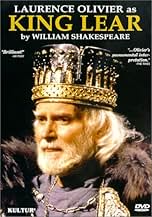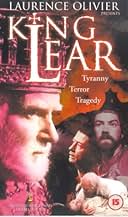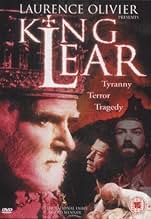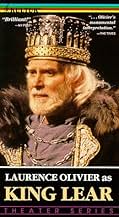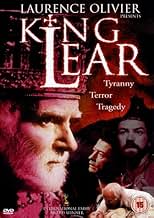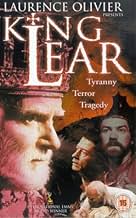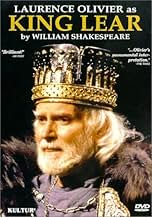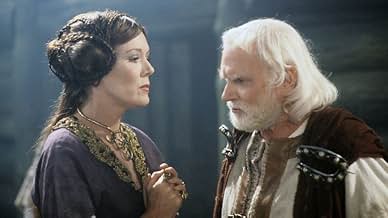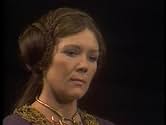अपनी भाषा में प्लॉट जोड़ेंAging King Lear invites disaster when he abdicates to his two disloyal and obsequious daughters while rejecting the one who truly loves him.Aging King Lear invites disaster when he abdicates to his two disloyal and obsequious daughters while rejecting the one who truly loves him.Aging King Lear invites disaster when he abdicates to his two disloyal and obsequious daughters while rejecting the one who truly loves him.
- 1 प्राइमटाइम एमी जीते
- 2 जीत और कुल 3 नामांकन
फ़ीचर्ड समीक्षाएं
This TV production was Laurence Olivier's final great performance, playing Lear at the age of 75 (beyond him perhaps on stage but cleverly done here).
He is supported by a large cast of stage actors - Dorothy Tutin, Anna Calder-Marshall and Diana Rigg as his daughters; Robert Lindsay and David Threlfall as the warring brothers Edmund and Edgar; Colin Blakely as Kent; Leo McKern as Gloucester; John Hurt as The Fool - all of which make their impact. The staging is memorable and pulls the viewer in to the action.
Comparable to really being there watching the greats at work in the theatre, and a fantastic piece of television drama.
He is supported by a large cast of stage actors - Dorothy Tutin, Anna Calder-Marshall and Diana Rigg as his daughters; Robert Lindsay and David Threlfall as the warring brothers Edmund and Edgar; Colin Blakely as Kent; Leo McKern as Gloucester; John Hurt as The Fool - all of which make their impact. The staging is memorable and pulls the viewer in to the action.
Comparable to really being there watching the greats at work in the theatre, and a fantastic piece of television drama.
10Sirona
The whole production was beclouded with grayness, as suits the theme of seeing/sight, yet the acting was elegiac. Diana Rigg and Dorothy Tutin were as seeming kindly as they were brutal. Robert Lindsay's Edmund was as poisonous as he was seemingly loving and loyal. But what I take away most specially was Olivier, as Lear, lifting a lock of his dead Cordelia's hair in his bowed hands to his face, taking a breath, a last scent. I cried. It was a most elegant summary of a parent's loss.
I am becoming increasingly aware that some of my favorite actors are just dumb, that they don't have a vision as grand as the work they are a part of. I don't know that this should be so surprising, given what it takes to be an actor.
Olivier both acts and directs here, and what we have is a shame because he just doesn't understand this play, the important half anyway. Half of the play is about the relationships among people, specifically about the parent-child relationship and its regal surrogate of fealty (the fool, Kent and Gloucester to the King). When Olivier is relating to one of these, he is marvelous.
But half of the play is about Lear's relationship to unseen demons, sprites, devils. He sees and relates to these as intensely and with as much duration as with the daughters. (This is mirrored by Gloucester who cannot see them.) In this part of the play, roughly the middle, the language comes alive as it takes us into the Elizabethan equivalent of science fiction. This is some of the best language in Shakespeare, which is to say the best stuff anywhere.
And what does Olivier give us? Mumbling, sometimes under the wind noise. The fulcrum of this magic is the sequence with the Fool and Poor Tom. It is the heart of the magic, which Shakespeare later amplified with the `trial.' Olivier cuts most of that, and gives us a muddle. (Literally, Tom wallowing in the mud.)
The music is horrid, as it is with his much earlier Hamlet. The swordplay is bombastic. The sets are cheesy, especially the faux Stonehenge. If he understood the importance of Stonehenge, why drop the notion of magic in the core of the play? I just don't get it: I don't understand how he couldn't get it.
At the very last page, Lear kneels over the dead Cordelia and says `my poor fool is hanged.' Then looking for life in a magical revival asks to have HER button undone, which likely undoes a garment like that we have seen on the long-lost Fool. Rich stuff that, as big a twist as `Sixth Sense.' But Olivier slurs over on his way to rambling about dogs and rats and then asks for HIS button to be undone. My my.
Advice: Lear is one of the very best of the plays. I'll grant that Olivier is a fine actor, but this is a very poor offering indeed. Ignore.
Olivier both acts and directs here, and what we have is a shame because he just doesn't understand this play, the important half anyway. Half of the play is about the relationships among people, specifically about the parent-child relationship and its regal surrogate of fealty (the fool, Kent and Gloucester to the King). When Olivier is relating to one of these, he is marvelous.
But half of the play is about Lear's relationship to unseen demons, sprites, devils. He sees and relates to these as intensely and with as much duration as with the daughters. (This is mirrored by Gloucester who cannot see them.) In this part of the play, roughly the middle, the language comes alive as it takes us into the Elizabethan equivalent of science fiction. This is some of the best language in Shakespeare, which is to say the best stuff anywhere.
And what does Olivier give us? Mumbling, sometimes under the wind noise. The fulcrum of this magic is the sequence with the Fool and Poor Tom. It is the heart of the magic, which Shakespeare later amplified with the `trial.' Olivier cuts most of that, and gives us a muddle. (Literally, Tom wallowing in the mud.)
The music is horrid, as it is with his much earlier Hamlet. The swordplay is bombastic. The sets are cheesy, especially the faux Stonehenge. If he understood the importance of Stonehenge, why drop the notion of magic in the core of the play? I just don't get it: I don't understand how he couldn't get it.
At the very last page, Lear kneels over the dead Cordelia and says `my poor fool is hanged.' Then looking for life in a magical revival asks to have HER button undone, which likely undoes a garment like that we have seen on the long-lost Fool. Rich stuff that, as big a twist as `Sixth Sense.' But Olivier slurs over on his way to rambling about dogs and rats and then asks for HIS button to be undone. My my.
Advice: Lear is one of the very best of the plays. I'll grant that Olivier is a fine actor, but this is a very poor offering indeed. Ignore.
The foremost Shakespearean actor of the 20th century took on what he considered his most challenging role when he did a television production of King Lear in 1983. Laurence Olivier said that because Lear is on stage so much of the time as the title character and is an old man, that it's an impossible role to play when you're young and starting out. And by the time you have the acting chops for the job you might just be too old to endure the rigors of playing it on stage.
Olivier had retired from the stage in the early Seventies and he would not take on the rigors of a play. But this televised production is his swansong to the immortal Bard. It's a tribute to Olivier's skill as an actor that he gets all the emotions going with Lear at once, pride, vanity, sorrow, and a bit of stupidity thrown in.
The story of the old king dividing his realm of Britain comes from the early days post the Roman occupation of Britain. Lear is a mythical king much as Arthur is from that period. His greatest sin is that he stayed around too long, he's in his eighties and his daughters have been waiting for their inheritance. The Eighties is a decent lifespan for any human, but in those days it was nothing less than remarkable someone would live that long.
Shakespeare also had a more recent example of a monarch giving up his power and dividing his realm. The great Emperor Charles V in 1555 gave up the Hapsburg empire which included both the Holy Roman Empire and the Kingdom of Spain and all the lands in the old and new worlds it possessed. Spain went to his son and the Holy Roman Empire went to his brother. They had their problems, but it was sure more peaceful than how it went with daughters Regan and Goneril played by Diana Rigg and Dorothy Tutin. As for Charles V, he lived the rest of his life peacefully in a monastery away from the cares of running a huge chunk of the world's real estate, dying in 1557.
There's a third daughter Cordelia played by Anne-Calder Marshall. When Lear the old fool asks each daughter how much they love him, the other two throw the flattery on with a shovel. Cordelia hesitates with her answer and gets banished in an arbitrary act. Absolute monarchs like Lear tend to act arbitrarily. That's part of the plot.
The secondary storyline concerns the Duke of Gloucester played by Leo McKern and his sons, one legitimate and the other out of wedlock. The legitimate one Edgar is played by David Threlfell and Edmund the illegitimate son is played by Robert Lindsay. Edmund is a calculating villain much like Iago in Othello. He manages to turn the Duke against Edgar, but he's after much bigger stakes than that, wooing Regan and Goneril behind their husband's back. It leads to war and a wholesale slaughter of the cast much like Hamlet.
Lear is a fool and has a fool played by John Hurt. Next to Olivier, he's the one you'll remember in the cast. Back in those days nobility were the only ones who could afford professional entertainment and the fool came on in his Harlequin outfit, say a few amusing things, but listen real close. Hurt sees an observes a lot and he's trying a few subtle suggestions to his master about the errors he made.
Set in ancient times King Lear's story is one repeated over and over again about staying in power too long, the resentments will build and the intrigues will follow. Shakespeare saw enough of that in his time both with his two monarchs Elizabeth I and James I. But he couldn't write about them lest his head be parted from his shoulders. I do wonder if some of the court politicians in those reigns saw a bit of themselves in King Lear.
Olivier had retired from the stage in the early Seventies and he would not take on the rigors of a play. But this televised production is his swansong to the immortal Bard. It's a tribute to Olivier's skill as an actor that he gets all the emotions going with Lear at once, pride, vanity, sorrow, and a bit of stupidity thrown in.
The story of the old king dividing his realm of Britain comes from the early days post the Roman occupation of Britain. Lear is a mythical king much as Arthur is from that period. His greatest sin is that he stayed around too long, he's in his eighties and his daughters have been waiting for their inheritance. The Eighties is a decent lifespan for any human, but in those days it was nothing less than remarkable someone would live that long.
Shakespeare also had a more recent example of a monarch giving up his power and dividing his realm. The great Emperor Charles V in 1555 gave up the Hapsburg empire which included both the Holy Roman Empire and the Kingdom of Spain and all the lands in the old and new worlds it possessed. Spain went to his son and the Holy Roman Empire went to his brother. They had their problems, but it was sure more peaceful than how it went with daughters Regan and Goneril played by Diana Rigg and Dorothy Tutin. As for Charles V, he lived the rest of his life peacefully in a monastery away from the cares of running a huge chunk of the world's real estate, dying in 1557.
There's a third daughter Cordelia played by Anne-Calder Marshall. When Lear the old fool asks each daughter how much they love him, the other two throw the flattery on with a shovel. Cordelia hesitates with her answer and gets banished in an arbitrary act. Absolute monarchs like Lear tend to act arbitrarily. That's part of the plot.
The secondary storyline concerns the Duke of Gloucester played by Leo McKern and his sons, one legitimate and the other out of wedlock. The legitimate one Edgar is played by David Threlfell and Edmund the illegitimate son is played by Robert Lindsay. Edmund is a calculating villain much like Iago in Othello. He manages to turn the Duke against Edgar, but he's after much bigger stakes than that, wooing Regan and Goneril behind their husband's back. It leads to war and a wholesale slaughter of the cast much like Hamlet.
Lear is a fool and has a fool played by John Hurt. Next to Olivier, he's the one you'll remember in the cast. Back in those days nobility were the only ones who could afford professional entertainment and the fool came on in his Harlequin outfit, say a few amusing things, but listen real close. Hurt sees an observes a lot and he's trying a few subtle suggestions to his master about the errors he made.
Set in ancient times King Lear's story is one repeated over and over again about staying in power too long, the resentments will build and the intrigues will follow. Shakespeare saw enough of that in his time both with his two monarchs Elizabeth I and James I. But he couldn't write about them lest his head be parted from his shoulders. I do wonder if some of the court politicians in those reigns saw a bit of themselves in King Lear.
I got lost through the first half of Olivier's Richard III. But his Lear some twenty years later sucked me in by absolute force. It may have been a bit difficult for me to ever have seen his King Lear storming across the battlefield, his sentimental age was disarming and effective. Particularly in the first scene with his dividing of the kingdom. He and Cordelia shared some intensely effective moments. His final moments are also moving and quite worthwhile. He gets a bit lost in the melodramatics of the middle, and more whines and rants "Reason not the need" than may have been necessary, but on the whole his performance shows the craft of his decades as a respected Shakespearean performer. The supporting cast is also very strong with all the daughters with the possible exception of Cordelia coming off very well. Hurt seems a bit jumbled as the fool, but that may have been the idea, and the parting shot of him tries to answer the old question of what happens to the fool after he fades out of the text. Edmund and Edgar could really be brothers, and work well in opposing roles. Both actors seem to love to show off their teeth through bushy beards, but despite moments of scenery chewing, they get the job done well. Leo McKern shines out of the supporting cast as Glouster. He is by turns jovial, tormented, lost, pained and thoughtful. An excellent interpretation of that role makes the work engaging for the stretch of time when Lear is taking his "forth act break". The sets and music may be a little crude, but the idea was that the acting be the focus, and fortunately it is. Very very nice and effective theatrical work.
क्या आपको पता है
- ट्रिवियाEsmond Knight (Old Man) previously appeared in all three Shakespearean films directed by Laurence Olivier: The Chronicle History of King Henry the Fifth with His Battell Fought at Agincourt in France (1944), Hamlet (1948) and Richard III (1955).
- कनेक्शनFeatured in The 36th Annual Primetime Emmy Awards (1984)
टॉप पसंद
रेटिंग देने के लिए साइन-इन करें और वैयक्तिकृत सुझावों के लिए वॉचलिस्ट करें
विवरण
इस पेज में योगदान दें
किसी बदलाव का सुझाव दें या अनुपलब्ध कॉन्टेंट जोड़ें


